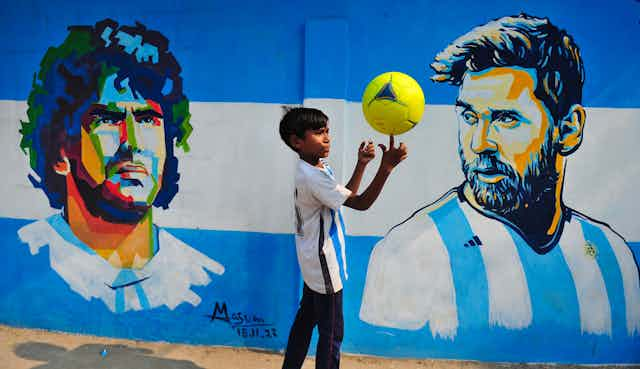Soccer fans are just 90 minutes of action away from knowing who will lift the World Cup and be crowned the beautiful game’s global champs. Well, given the refereeing during the tournament in Qatar, it is likely to be 90 minutes plus a few more. Even then, an extra 30 minutes could be added should the game be tied at that stage. And if still level after that, penalties await.
Penalties are unbearably tense. If, like me, you’d rather avert your eyes from the on-pitch drama at that point, then please find below three of the best World Cup articles from The Conversation to take your mind off those tense moments.
1. Messi the GOAT? Wait, don’t forget Maradona!
On Dec. 18, 2022, Lionel Messi will take what is likely to be his last steps on a World Cup soccer pitch – he may well end his international career lifting aloft the trophy he has coveted over five tournaments, his first being in 2006.
A stellar performance in the final will cement, in the mind of many soccer fans, that Messi really is the greatest player of all time.
But another diminutive Argentinian dribbling wizard lays – at least equal – claim to that title: Diego Maradona.
On the way to captaining his side to World Cup glory in 1986, Maradona gifted the soccer world with memorable moments of genius – none more so than in the quarterfinal against England when he scored the “goal of the century.” But special though that was, the match is remembered for another Maradona goal. Well, a goal claimed by Maradona but with a little help from the “hand of God.”
Stefan Szymanski, a sports economist at the University of Michigan, explains why that goal will never be forgotten – and what that says about the greatness of Maradona.
Read more: Why Maradona's 'Hand of God' goal is priceless -- and unforgettable
2. Europe vs. South America (again)
As with every World Cup since the tournament began in 1930, the two finalists come from one or two continents: Europe and South America.
Szymanski, again, has a theory why: Soccer suffers from what economists call “the middle income trap.”
“The idea is that developing nations start to catch up with the developed nations, but then they run into obstacles,” he explains.
Certainly teams from Africa and Asia are doing better than they were and have gained a newfound respect in the global game. But there have been no true breakthrough nations as of yet.
“The obstacle to further progress seems clear,” Szymanski writes. “Europe in particular continues to dominate the competition in which most footballers participate: club football. Players from European nations regularly play for clubs that include the best players from all over the world, ensuring that they are always up to date with the latest developments. Wealthy clubs also means the best facilities.” And because of historical ties to Spain, Italy and Portugal, soccer powerhouses Argentina and Brazil are hard-wired into this network.
The others, by and large, are left out in the cold. Except …
3. A breakthrough year for Africa?
Morocco had a quite fantastic tournament. They beat Belgium. They beat Spain. They even beat Ronaldo’s Portugal. OK, Morocco lost to France in the semifinal, but going out to the reigning title holders is no great shame. Moreover, in doing so, Morocco became the first African nation to make it to the final four of the World Cup. Quite some achievement for a team that few tipped for glory before the tournament began.
And that wasn’t the only African soccer breakthrough of late. As Howard University’s Chuka Onwumechili notes, 2022 was quite the year for lovers of the round ball in Africa. AFCON, the Africa Cup of Nations, got the year off to a flying start by showcasing the best the continent had to offer.
And the woman’s game made strides in Africa too, with the Confederation of African Football announcing for the first time a prize purse for the African Women’s Champions League. Meanwhile, a new Africa Super League is set to start in 2023.
“In the long term this should help develop stronger, better funded African clubs, better able to keep some top talents at home. If [Confederation of African Football] is able to pull this off, it will be a significant watershed in African football,” Onwumechili notes.
Read more: 6 moments in African football in 2022 that will be talked about for years to come
Editor’s note: This story is a roundup of articles from The Conversation’s archive.

